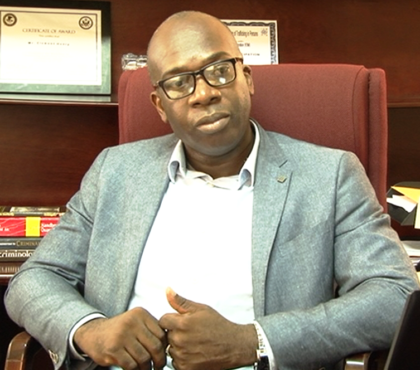Prison survey aims to build GPS’ capacity
GINA, GUYANA, Monday, August 22, 2016
A comprehensive nationwide prison survey is expected to begin in September by the Ministry of Public Security with the aim of designing rehabilitation and social reintegration services for prison inmates.
The survey will be funded by the Inter-American Development Bank to the value of US$2.3M through the Citizen Security Strengthening Programme (CSSP). The appraisal is part of the third component of the CSSP’s five- year programme

Project Manager of the Citizen Security Strengthening Programme, Clement Henry
Survey’s aim
The aim of the survey is to capture information on the experiences of inmates’ lives prior to incarceration, during imprisonment, and those who are recidivists (repeat offenders), Project Manager of the CSSP Clement Henry told the Government Information Agency (GINA) in a recent interview.
“The hope is that when we look at the information capturing what has been happening to these inmates and ex-inmates, we can be able to design programmes to target recidivism, and to also improve conditions in the prison. The pre-prison experiences will help us in terms of designing programmes to deal with ‘at risks youths’ so that they don’t end up in the prisons,” Henry pointed out.
Henry told GINA that the CSSP will begin crafting rehabilitation and social reintegration programmes on the preliminary findings. “These preliminary data will help us as we move towards developing a comprehensive rehabilitation, reintegration service, so that is why this survey is of critical importance,” Henry explained.
The data capturing period is expected to last six weeks with a preliminary report expected by the end of November. The final report is expected at the end of April 2017.
The comprehensive survey has more than 200 indicators. Henry noted that the survey will sample the male population, but will likely have full census of the female population. High risk prisoners are not expected to be a part of the survey.
The data collection will be implemented by the Tres de Febrero University of Argentina, in collaboration with the University of Guyana. Already, the CSSP is engaging the two universities to resolve the survey’s terms of reference.
“University of Guyana’s role would be to capture the data, and the Tres de Febrero University’s role is to analyse the data and prepare and compile the report. They will also overlook the implementation of the survey by the University of Guyana,” Henry explained to GINA.
Henry expressed confidence in the Argentine university’s lead role based on their extensive experience in conducting prison surveys in the hemisphere. “We feel confident that they will be able to do this task effectively,” Henry noted.
A 2015, United States, State Department Report on Human Rights had indicated that rehabilitation programmes within the local prison services did not adequately address the needs of prisoners. Overcrowding and the harsh conditions faced by inmates were also highlighted by the report.
More recently, a Commission of Inquiry into the prison riots of March 3 resulting in the death of 17 inmates pointed out overcrowding, and inadequate facilities as some of the shortcomings of the system.
Meanwhile, Henry said he hopes that the final report will generate intellectual presentations on the conditions of the prisons. “They will make recommendations from these reports and the recommendations we can pull and we can utilise.”
It is also hoped that the survey will enable knowledge transfer to the University of Guyana, “So we’re actually trying to improve scholarship in assessing what’s happening within our prisons and some of the factors that are driving our youths to being incarcerated,” Henry said.

